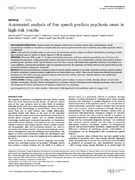Please use this identifier to cite or link to this item:
https://repositorio.ufrn.br/handle/123456789/19184| Title: | Automated analysis of free speech predicts psychosis onset in high-risk youths |
| Authors: | Bedi, Gillinder Carrillo, Facundo Cecchi, Guillermo A Slezak, Diego Fernández Sigman, Mariano Mota, Natália B Ribeiro, Sidarta Tollendal Gomes Javitt, Daniel C Copelli, Mauro Corcoran, Cheryl M |
| Keywords: | Neuroscience;Schizophrenia |
| Issue Date: | 26-Aug-2015 |
| Publisher: | Nature |
| Citation: | Bedi G, Carrillo F, Cecchi GA, Slezak DF, Sigman M, Mota NB, Ribeiro S, Javitt DC, Copelli M, Corcoran CM. (2015) Automated analysis of free speech predicts psychosis onset in high-risk youths. NPJ Schizophrenia 1, Article number: 15030. doi:10.1038/npjschz.2015.30. |
| Abstract: | Background/Objectives: Psychiatry lacks the objective clinical tests routinely used in other specializations. Novel computerized methods to characterize complex behaviors such as speech could be used to identify and predict psychiatric illness in individuals. AIMS: In this proof-of-principle study, our aim was to test automated speech analyses combined with Machine Learning to predict later psychosis onset in youths at clinical high-risk (CHR) for psychosis. Methods: Thirty-four CHR youths (11 females) had baseline interviews and were assessed quarterly for up to 2.5 years; five transitioned to psychosis. Using automated analysis, transcripts of interviews were evaluated for semantic and syntactic features predicting later psychosis onset. Speech features were fed into a convex hull classification algorithm with leave-one-subject-out cross-validation to assess their predictive value for psychosis outcome. The canonical correlation between the speech features and prodromal symptom ratings was computed. Results: Derived speech features included a Latent Semantic Analysis measure of semantic coherence and two syntactic markers of speech complexity: maximum phrase length and use of determiners (e.g., which). These speech features predicted later psychosis development with 100% accuracy, outperforming classification from clinical interviews. Speech features were significantly correlated with prodromal symptoms. Conclusions: Findings support the utility of automated speech analysis to measure subtle, clinically relevant mental state changes in emergent psychosis. Recent developments in computer science, including natural language processing, could provide the foundation for future development of objective clinical tests for psychiatry. |
| URI: | https://repositorio.ufrn.br/jspui/handle/123456789/19184 |
| ISSN: | 2334-265X |
| Appears in Collections: | ICe - Artigos publicados em periódicos |
Files in This Item:
| File | Description | Size | Format | |
|---|---|---|---|---|
| NataliaMota_ICE_Automated analysis of_2015.pdf | Artigo completo | 1,08 MB | Adobe PDF |  View/Open |
Items in DSpace are protected by copyright, with all rights reserved, unless otherwise indicated.

